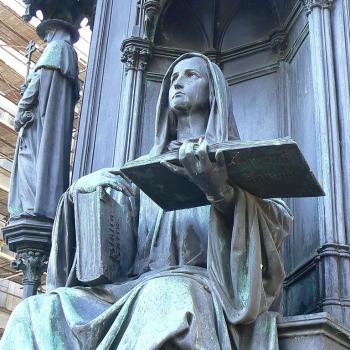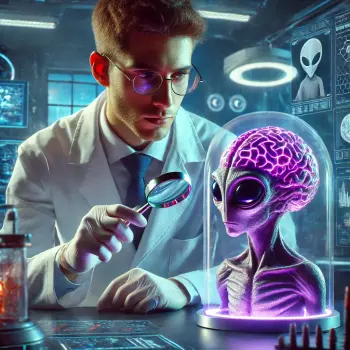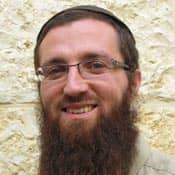I would like to share with you something I saw in an email in honor of the new year from the always insightful and inspiring Rabbi Avrohom Lipszyc of North Miami, Florida.
He had recently talked with a psychiatrist and asked him when and how he decides to administer medicine, and when and how he decides that a person can come off the medicine. His question was primarily based on there being no blood tests on which a prescription is decided, just discussion with the patient about his feelings.
The psychologist answered him that when a person feels that God will help and that all is going to be all right, then he doesn't need medicine. However, when a person is plagued by anxieties of uncertainty and doom, then he needs medicine in order to be able to function.
Certainty v. Uncertainty
The rabbi went on to explain in his email that throughout the books of Prophets, when one is about to become a leader, such as Joshua, we find the terminology "ruach," meaning "spirit" (i.e., "And he was filled with a spirit"). One commentary defines this "spirit" as a sense of strength and certainty, with no weakness and doubt, for he feels that God is with him.
The truth is that certainty is not a human trait. After all, humans are dependent, and any being that is dependent upon another can never truly have certainty. Rather, certainty is a divine attribute since it is God alone that is dependent upon no one and no thing.
Therefore, the human gift of certainty is a manifestation of the Godly human soul. When we are living out the reality of our soul, we feel certain and we feel that God is with us no matter what the result will be.
Turbulent Times
Over the past few years, in which we have experienced economic challenges and downfalls, we have suddenly faced our fragility. This coupled with a rise in terrorism and an increasing sense of insecurity has deepened our feelings of fragility. Upon this, place the frosting of our politicians' game of control through fear and foreboding prophecy; we are spiraling into uncertainty in great measures. We are slowly becoming people of uncertainty, seemingly in need of some sort of medicine to stabilize our sanity.
While humans are creatures of uncertainty by definition, our sanity demands and depends upon a level of certainty. Therefore, the choice is to either find some drug to artificially stabilize our society and ourselves or to reevaluate our lives: who we are at our core and the extent to which we are practically living that out. It is when we align ourselves with our inner Godly core that we restore our trust in God and in His goodness, leading us to sanity, certainty, and joyfulness.
Choking on the Smoke
As we know, more firefighters have fallen to smoke inhalation than have fallen to the flames of fire. So too with us in our present situation; there is the smoke of our situation and there is the fire of our situation. We must identify and separate the fire from the smoke. The fire is the political, economic, and security problems we face, and the smoke is our own induced panic and paralysis of worry and uncertainty. More of us are presently falling to smoke inhalation than those being consumed by the actual flames of our predicaments.
Holiday Joy
Turning around this self-induced paralysis is what this time period in the Jewish calendar is all about.
Despite being referred to in the prayers as the "birthday" of the world, Rosh Hashona is actually the birthday of the purpose of the world—the day that the human being was created. It is on this day that God's relationship with the world becomes a two-way street. Not only is God making moves toward creation, but creation is now making moves toward God.
Therefore, Rosh Hashona is that time when we recognize and internalize the reality of God as the root of every detail in our lives and focus on our relationship with God as the ultimate purpose and goal worth striving for.
Once clarifying this, we come to reevaluate the previous 364 days of the year: what have we been doing with our time? What have we been emphasizing as important? How have we been prioritizing our lives? How have we been reacting to those around us? How have we been treating others? How much have we been bringing God into our lives? How much have we been consciously or unconsciously pushing God out of our lives?
This mindset and introspection takes us through the next ten days referred to as the Ten Days of Repentance culminating in Yom Kippur, when we focus on bringing the mindset of Rosh Hashona from the head to the heart, from the intellectual to the emotional, to feel what we know and to accept upon ourselves to change.
After Yom Kippur comes the Festival of Booths called Sukkot. We leave our permanent homes to dwell in temporary booths, putting on display that what we tend to view as permanent is actually temporary. We demonstrate in action that we are aiming for spiritual growth and not merely physical comforts. Most importantly, we move from our sturdy homes in which we tend to look at ourselves as the master of our domain to a flimsy booth in which we are signifying reliance on God.
Thus, the holiday experience of this time of year is a process and experience of internalization of God as the core and goal of our lives, from the level of intellect to the level of emotion to the level of action.
When we take this in and live it, we come to personal confidence, security, and true joy, as we know we are living out our potential and walking with God; we become people of certainty and strength, people of the spirit.
A good and sweet year to all!
10/9/2011 4:00:00 AM





